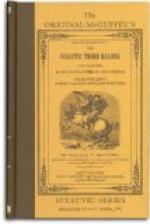5. It seemed to be wrapped in a great dark shawl
(For the night was a
little cold, you know,);
It would not speak. It was
black and tall;
And it walked so proudly
and very slow.
Then it mocked me everything I could
do:
Now it caught at the
lightning flies like me;
Now it stopped where the elder blossoms
grew;
Now it tore the thorns
from a gray bent tree.
6. Still it followed me under the yellow moon,
Looking back to the
graveyard now and then,
Where the winds were playing the
night a tune—
But, Kate, a Ghost doesn’t
care for men,
And your papa could n’t have
done it harm.
Ah! dark-eyed darling,
what is it you see?
There, you needn’t hide in
your dimpled arm—
It was only my shadow
that walk’d with me!
LXVI. THE ELEPHANT. (180)
1. The elephant is the largest of quadrupeds; his height is from eight to fourteen feet, and his length, from ten to fifteen feet. His form is that of a hog; his eyes are small and lively; his ears are long, broad and pendulous. He has two large tusks, which form the ivory of commerce, and a trunk, or proboscis, at the end of the nose, which he uses to take his food with, and for attack or defense. His color is a dark ash-brown.
2. Elephants often assemble in large troops; and, as they march in search of food, the forests seem to tremble under them. They eat the branches of trees, together with roots, herbs, leaves, grain, and fruit, but will not touch fish nor flesh. In a state of nature, they are peaceable, mild, and brave; exerting their power only for their own protection or in defense of their own species.
3. Elephants are found both in Asia and Africa, but they are of different species, the Asiatic elephant having five toes, and the African, three. These animals are caught by stratagem, and, when tamed, they are the most gentle, obedient, and patient, as well as the most docile and sagacious of all quadrupeds. They are used to carry burdens, and for traveling. Their attachment to their masters is remarkable; and they seem to live but to serve and obey them. They always kneel to receive their riders; or the loads they have to carry.
4. The anecdotes illustrating the character of the elephant are numerous. An elephant which was kept for exhibition at London, was often required, as is usual in such exhibitions, to pick up with his trunk a piece of money thrown upon the floor for this purpose. On one occasion a sixpence was thrown, which happened to roll a little out of his reach, not far from the wall. Being desired to pick it up, he stretched out his proboscis several times to reach it; failing in this, he stood motionless a few seconds, evidently considering how to act.
5. He then stretched his proboscis in a straight line as far as he could, a little distance above the coin, and blew with great force against the wall. The angle produced by the opposition of the wall, made the current of air act under the coin, as he evidently supposed it would, and it was curious to observe the sixpence traveling toward the animal till it came within his reach, when he picked it up.




